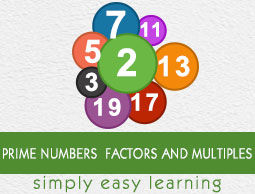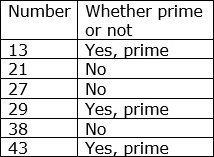
- Prime Numbers Factors and Multiples
- Home
- Even and Odd Numbers
- Divisibility Rules for 2, 5, and 10
- Divisibility Rules for 3 and 9
- Factors
- Prime Numbers
- Prime Factorization
- Greatest Common Factor of 2 Numbers
- Greatest Common Factor of 3 Numbers
- Introduction to Distributive Property
- Understanding the Distributive Property
- Introduction to Factoring With Numbers
- Factoring a Sum or Difference of Whole Numbers
- Least Common Multiple of 2 Numbers
- Least Common Multiple of 3 Numbers
- Word Problem Involving the Least Common Multiple of 2 Numbers
Prime Numbers
Prime numbers
A number is a prime number if its only factors are 1 and itself.
7 is a prime number. Its factors are 1 and 7 itself
Some examples of prime numbers are 2, 3, 5, 7, 11, 13 and so on.
2 is the only even prime number. All other prime numbers are odd numbers
Composite numbers
If a number has three or more factors, it is a composite number. A number which has factors in addition to one and itself is called a composite number.
6 is a composite number. It has four factors; 1, 2, 3 and 6
For example: 4, 6, 8, 9, 10, 12,...are examples of some composite numbers
All even numbers except 2 are composite numbers.
Neither Prime nor Composite0 and 1 are neither prime numbers nor composite numbers.
State whether each number in table below is prime or not.

Solution
Step 1:

Step 2:
Of the given numbers 18, 28 and 35 have three or more factors. So they are not prime but composite numbers.
Step 3:
The numbers 5, 23 and 31 have only 1 and themselves as factors. So these numbers are prime numbers.
State whether each number in table below is prime or not.

Solution
Step 1:

Step 2:
Of the given numbers 21, 27 and 38 have three or more factors. So they are not prime but composite numbers.
Step 3:
The numbers 13, 29 and 43 have only 1 and themselves as factors. So these numbers are prime numbers.